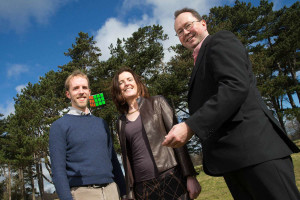NTR FOUNDATION INVESTS €750,000 IN MAREI RESEARCH ON CLIMATE CHANGE
MAREI and NTR Foundation Collaborate on A Fully Integrated ‘Low Carbon Future’ Research Programme for Ireland
 Dublin & Cork, 4 April 2016: Ireland’s research centre for marine and renewable energy, MaREI, has secured €750,000 in funding from the NTR Foundation. The philanthropic investment will be used to identify and exploit the opportunities for Ireland, the economy and SMEs in relation to how we best meet our future energy requirements as we transition to a low carbon economy.
Dublin & Cork, 4 April 2016: Ireland’s research centre for marine and renewable energy, MaREI, has secured €750,000 in funding from the NTR Foundation. The philanthropic investment will be used to identify and exploit the opportunities for Ireland, the economy and SMEs in relation to how we best meet our future energy requirements as we transition to a low carbon economy.
Rosheen McGuckian, Chair of the NTR Foundation said: “We are very pleased to support this ground-breaking research project, which will address opportunities for climate change mitigation. The UCC Environmental Research Institute and the MaREI Centre are acknowledged leaders in this field and this work will contribute to building resilience for Ireland in a number of scenarios, while also identifying opportunities for entrepreneurs.”
Like many other countries, Ireland faces significant challenges in meeting future energy needs, while also addressing climate change and transitioning to a low carbon economy. Most energy needs (93%) are currently being met by fossil fuels and 89% of Ireland’s energy is imported, posing challenges and yet enormous opportunities for Ireland in the energy efficiency and renewables sectors.
“Ireland is already leading the way globally in terms of integrating the highest levels of variable renewable electricity onto a synchronous power system. Over the last 15 years, our share of electricity from renewable sources has grown to 23% and we have reduced the carbon intensity by 50%.” said Brian O’Gallachoir, Principal Investigator at MaREI and Professor of Energy Policy and Modelling at UCC. “This strategic investment by NTR Foundation in our research is critical to extending these opportunities beyond electricity to explore the entire energy system. Traditionally energy planning has looked at single sectors of the economy in isolation (for example: wind and electricity). This has limitations and is somewhat like trying to solve a Rubik’s cube by looking at one face only. Integrated energy systems modelling, on the other hand, allows all dimensions of the problem to be analysed together, enabling us to unlock the opportunities associated with the complete transition to a low carbon economy (i.e. across heat and transport as well as electricity). The insights we discover will certainly help inform the future shape of the renewables sector as well as organisations and SMEs operating in that market.”
Professor Mark Ferguson, Director General, Science Foundation Ireland and Chief Scientific Adviser to the Government of Ireland, welcomed the announcement, “this is the largest single investment from the private sector to date in MaREI, which is an SFI Research Centre undertaking cutting-edge research in marine and renewable energy. Collaborations between academia and industry help to drive discovery from the lab to the market place – excellence with impact. This collaborative research will address the significant challenges in renewable energy.”
The collaboration between the MaREI Centre and the NTR Foundation through UCC’s Environmental Research Institute (ERI) will take an integrated energy systems modelling approach. Using a suite of analytical techniques and methodologies, the research will explore low carbon energy futures for Ireland with an emphasis on resilient solutions in a large number of scenarios of varying ambition, risk and cost. The project will help to identify technology opportunities for entrepreneurs in Ireland over the next 35 years arising from a low carbon energy future and it will assess in detail the value chain for these opportunities in order to determine genuine win-wins for Ireland. The work will be carried out over 3 years by the researchers in the ERI in association with colleagues in MaREI and NTR.
